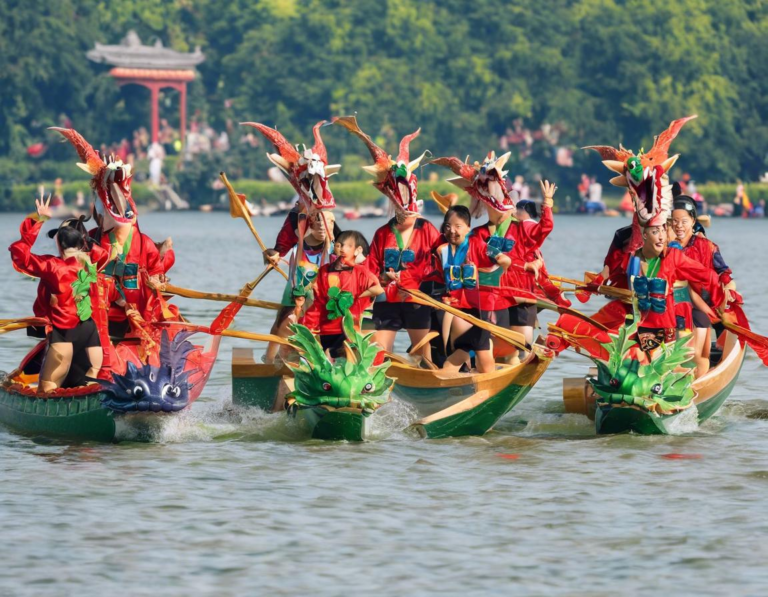History and Significance of the Dragon Boat Festival

The Dragon Boat Festival, also known as Duanwu Jie, is a vibrant and ancient Chinese holiday celebrated with colorful dragon boat races, delicious sticky rice dumplings, and traditional customs. This festive occasion holds deep historical and cultural significance, commemorating the life and legacy of a renowned poet and statesman, Qu Yuan.
The Origins: A Tale of Patriotism and Sacrifice
The Dragon Boat Festival’s origins can be traced back to the Warring States Period (475-221 BC) in ancient China. The story revolves around Qu Yuan, a loyal and patriotic minister who served the state of Chu.
During a time of political turmoil and conflict, Qu Yuan witnessed the decline of his beloved Chu kingdom. Deeply saddened and disillusioned by the corruption and betrayal within the ruling class, he was unjustly exiled and banished.
Driven by a sense of despair and loyalty, Qu Yuan decided to take his own life by drowning himself in the Miluo River on the fifth day of the fifth lunar month. This tragic event occurred in 278 BC.
The Legend of Qu Yuan: A Poet and Patriot
Qu Yuan was not only a dedicated statesman but also a renowned poet known for his eloquent and patriotic writings. His works, such as “Li Sao” and “Tian Wen,” are still celebrated today for their lyrical beauty and poignant themes of love, loss, and the pursuit of justice.
Qu Yuan’s legacy transcends his tragic end. He is remembered as a symbol of patriotism, integrity, and unwavering loyalty to his country. His story continues to inspire generations of Chinese people, serving as a reminder of the importance of upholding moral values and fighting for what one believes in.
The Birth of the Dragon Boat Festival: Paying Tribute to Qu Yuan
Following Qu Yuan’s death, local villagers, filled with grief and a desire to honor his memory, rushed to the river to try and retrieve his body. They paddled out in their boats, beating drums and throwing rice into the water to appease the river spirits and prevent them from harming Qu Yuan’s soul.
This act of compassion and remembrance evolved into the annual celebration we know today as the Dragon Boat Festival. The dragon boat races, a vibrant display of teamwork and athleticism, symbolize the efforts of the villagers to find Qu Yuan.
The sticky rice dumplings, known as zongzi, represent the rice that was thrown into the river to feed Qu Yuan’s spirit. The tradition of eating zongzi on the Dragon Boat Festival is a way to honor Qu Yuan’s memory and share a meal in his spirit.
The Symbolic Meaning of Dragon Boats and Races
Dragon boats, adorned with colorful decorations and vibrant carvings, are more than just vessels. They symbolize the spirit of unity, perseverance, and determination. The fierce competition of the dragon boat races reflects the spirit of Qu Yuan and his unwavering commitment to his ideals.
Each crew member works together, paddling in unison to propel the dragon boat forward. This teamwork and synchronization are essential for success in the race. The dragon boat races are a testament to the power of collective effort and the importance of achieving shared goals.
Beyond the Races: Exploring the Customs and Traditions
The Dragon Boat Festival is a time for celebration and remembrance. Beyond the races and zongzi, there are numerous customs and traditions that contribute to the festive atmosphere.
Wearing Fragrant Sachets: On this day, people wear small, fragrant sachets known as xiangbao around their necks or wrists. These sachets, filled with herbs and spices, are believed to ward off evil spirits and promote good health.
Hanging Calamus and Wormwood: Traditionally, families would hang bundles of calamus and wormwood, two herbs with medicinal properties, at their doorways. These herbs are believed to protect against disease and misfortune, creating a safe and auspicious environment within the home.
The Significance of the Fifth Lunar Month: The fifth lunar month, when the Dragon Boat Festival falls, is often associated with the “Five Poisons” – snakes, centipedes, scorpions, lizards, and toads. This period is considered to be a time when these creatures are most active and potentially dangerous. The Dragon Boat Festival customs, such as wearing sachets and hanging calamus and wormwood, are believed to help ward off these harmful creatures and protect people from their influence.
The Dragon Boat Festival in Modern Times: A Global Celebration
While rooted in ancient traditions, the Dragon Boat Festival has evolved and spread beyond its Chinese origins. Today, it is celebrated by people of Chinese descent all over the world.
From the bustling streets of Hong Kong to the vibrant communities of San Francisco and Toronto, the Dragon Boat Festival is a colorful and joyous occasion. It has become a way for Chinese communities to connect with their heritage, celebrate their cultural identity, and share the spirit of the festival with the world.
Dragon Boat Races Around the World: In recent years, dragon boat racing has gained immense popularity worldwide, becoming a sport enjoyed by people of all backgrounds.
International Dragon Boat Festivals: Major cities across the globe host international dragon boat festivals, drawing thousands of participants and spectators. These events showcase the sport’s growing popularity and its ability to transcend cultural boundaries.
Conclusion: The Enduring Legacy of the Dragon Boat Festival
The Dragon Boat Festival stands as a testament to the enduring power of tradition and cultural memory. This vibrant holiday honors a legendary figure, Qu Yuan, and celebrates his ideals of patriotism, integrity, and unwavering loyalty.
Beyond its historical significance, the Dragon Boat Festival remains a vibrant cultural event that promotes unity, teamwork, and the spirit of perseverance. The dragon boat races, the delicious zongzi, and the various customs continue to inspire and delight people around the world, ensuring that this ancient tradition lives on for generations to come.
Sources:












